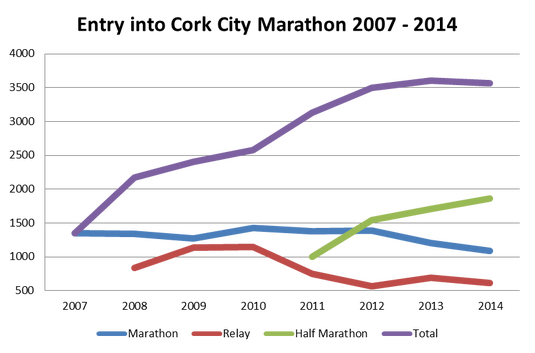 Alex O’Shea set a new world record time of of 3hrs 41mins 10secs
Alex O’Shea set a new world record time of of 3hrs 41mins 10secs On the June back holiday weekend I yet again endeavoured to complete a leg of the Cork City Marathon relay. This has become somewhat of an annual event in our School and with the help of four colleagues (including fellow sporteconomics.org contributors Declan Jordan and John Eakins) we set about running through the streets of Cork city.
Reconstituted in 2007 (the race was run from 1982 – 1986), the marathon is one of the best spectacles you will see throughout the year on the banks of the River Lee. The sense of community spirit is palpable with competitors and spectators alike encouraging those that seek to complete the course, be it 26.2m (full marathon), 13.1 miles (half marathon) or 5+ miles (relay). What’s more, the race brings together all sorts of athletes, from those seeking to win the races, to those just happy to complete a leg of the course, even firemen attempting to break world records!
It was during my 5.2miles of the race that my mind began to wander and I started to think about the the race from a public health perspective. Surely no other event in the Cork calendar has more of a positive impact on both physical and mental health. Athletes training for both full and half marathons are advised to start training around the New Year. By the time the June bank holiday arrives they have spent many hours, running hundreds of kilometres of both city and rural Ireland (in most cases!). Us relay runners however spend much less time out and about but still need to train in the weeks before the race. The cost associated with hosting the race is minimal. Most of the infrastructure is in place already. Some hosting costs (barriers, extra Gardí, etc.) are required but most is covered mainly by the cost of entry into the race.
€737,000,000 was allocated to Mental Health Services in Ireland under Vote 39 of the 2014 Revised Estimates (Health Service Executive). I doubt any of this allocation goes towards planning or staging the Cork City marathon. Despite this, the race is surely one of the best value for money initiatives in the region at promoting and maintaining mental health. The good news too is that the race is growing in popularity. The table below presents data on the reconstituted race since 2007. Given relay teams and repeat competitors it’s very hard to know exactly how many individuals have run in the race since 2007 but one can estimate that approximately 50,000 entrants have run through the street of Cork city.

 RSS Feed
RSS Feed